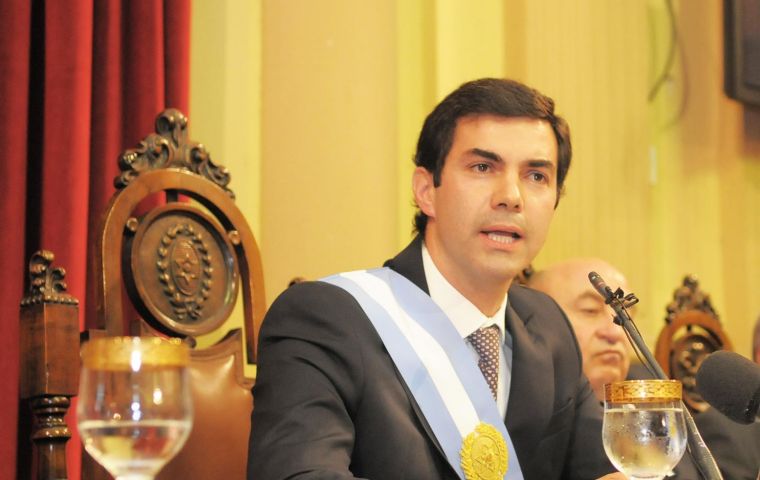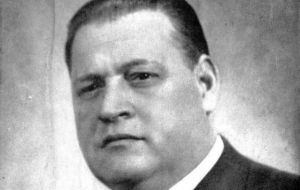MercoPress. South Atlantic News Agency
“Malvinas March” compulsory singing after the Argentine anthem in Salta province
 The bill approved by the provincial Senate was signed and put into effect last 30 June by governor Juan Manuel Uturbey.
The bill approved by the provincial Senate was signed and put into effect last 30 June by governor Juan Manuel Uturbey.  “The Malvinas March” was composed back in 1940 and was the winning song of a competition organized by a Malvinas Recovery group, under president Ortiz.
“The Malvinas March” was composed back in 1940 and was the winning song of a competition organized by a Malvinas Recovery group, under president Ortiz.  The “Malvinas March” is compulsory in all school, civilian and military events
The “Malvinas March” is compulsory in all school, civilian and military events As of this week it is official in the Argentine province of Salta: after playing the Argentine national anthem, the “Malvinas March” is compulsory in all school, civilian and military events in that provincial territory. The bill approved by the provincial Senate was signed and put into effect last 30 June by governor Juan Manuel Uturbey.
The original presentation was controversial according to local media because some Salta residents felt it was forcing a point of view on history which was against the free interpretation of historical events.
This is 'mandatory patriotism'“ said several Salta residents who did not agree and complained that the provincial government was wanting to impose certain feelings on individuals, and recalled how back in 1952/53 following the death of Evita Peron it was mandatory to dress in mourning.
Likewise the initiative was criticized and even ridiculed by Falkland Islanders and British citizens, basically arguing it sounded much ”like an adoctrination of the masses“.
However with time the issue was no longer in the headlines and the enforcement of the bill only occupied a few lines in an inside page in Salta's main daily ”El Tribuno“, when it was recently published.
”The Malvinas March“ was composed back in 1940 by Jose Tieri and Carlos Obligado, and was the winning song of a competition organized by the Malvinas Recovery Junta, under Argentine president Roberto Marcelino Ortiz. Since then it became the official anthem.
The lyrics refer to the Malvinas landscape and scenery but above all it calls on the Argentine people not to forget the recovery of the Islands which are described as the ”lost austral pearl“, and ”there is no more loved piece of soil in our homeland”.




Top Comments
Disclaimer & comment rules-

-

-

Read all commentsPfft. The gringos were on to this years ago.
Aug 07th, 2015 - 07:12 am 0“Almost overnight the Glorious Loyalty Oath Crusade was in full flower, and Captain Black was enraptured to discover himself spearheading it. He had really hit on something. All the enlisted men and officers on combat duty had to sign a loyalty oath to get their map cases from the intelligence tent, a second loyalty oath to receive their flak suits and parachutes from the parachute tent, a third loyalty oath for Lieutenant Balkington, the motor vehicle officer, to be allowed to ride from the squadron to the airfield in one of the trucks. Every time they turned around there was another loyalty oath to be signed. They signed a loyalty oath to get their pay from the finance officer, to obtain their PX supplies, to have their hair cut by the Italian barbers. To Captain Black, every officer who supported his Glorious Loyalty Oath Crusade was a competitor, and he planned and plotted twenty-four hours a day to keep one step ahead. He would stand second to none in his devotion to country. When other officers had followed his urging and introduced loyalty oaths of their own, he went them one better by making every son of a bitch who came to his intelligence tent sign two loyalty oaths, then three, then four; then he introduced the pledge of allegiance, and after that “The Star-Spangled Banner,” one chorus, two choruses, three choruses, four choruses. Each time Captain Black forged ahead of his competitors, he swung upon them scornfully for their failure to follow his example. Each time they followed his example, he retreated with concern and racked his brain for some new stratagem that would enable him to turn upon them scornfully again.”
Joseph Heller, Catch-22
Nice to see the kids have been properly taught to do *the salute* in that last picture. I wonder if the song begins “Argentina uber alles, Uber alles in der welt.”
Aug 07th, 2015 - 07:35 am 0Without realizing how it had come about, the combat men in the squadron discovered themselves dominated by the administrators appointed to serve them. They were bullied, insulted, harassed and shoved about all day long by one after the other. When they voiced objection, Captain Black replied that people who were loyal would not mind signing all the loyalty oaths they had to. To anyone who questioned the effectiveness of the loyalty oaths, he replied that people who really did owe allegiance to their country would be proud to pledge it as often as he forced them to. And to anyone who questioned the morality, he replied that “The Star-Spangled Banner” was the greatest piece of music ever composed. The more loyalty oaths a person signed, the more loyal he was; to Captain Black it was as simple as that, and he had Corporal Kolodny sign hundreds with his name each day so that he could always prove he was more loyal than anyone else.
Aug 07th, 2015 - 07:47 am 0“The important thing is to keep them pledging,” he explained to his cohorts. “It doesn’t matter whether they mean it or not. That’s why they make little kids pledge allegiance even before they know what ‘pledge’ and ‘allegiance’ means.”
Commenting for this story is now closed.
If you have a Facebook account, become a fan and comment on our Facebook Page!